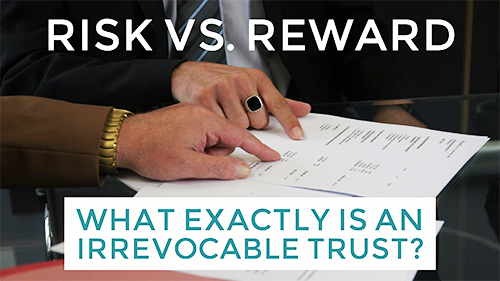
In the simplest terms, an irrevocable trust is a specific agreement between the individuals or entities creating the trust, the trustee (or trustees) who will manage the trust, and the beneficiaries that will benefit from the trust. The trust creator must follow certain legal requirements, sign the trust document, and then transfer any property to the trust that should be included to pass to beneficiaries. If they don’t title the properties or identify the assets in the trust’s name, the court will likely disallow those specific assets from inclusion in the trust.

Many people mistakenly believe that wills do not have to go through the probate. This is not true! In fact, the best way to avoid the arduous probate process is to make a living (or inter-vivos) trust. These trusts can be created in conjunction with a will, or as an alternative to one. Creating a living trust will save time, money, and the hassle of dealing with probate hearings. Here, we'll look at the basic aspects of living trusts.

For most people, being named the executor (or personal representative) of an estate is an honor. However, the job comes with many unforeseen challenges and obligations. The difficulty of the role generally correlates with the size of the estate.

At some point, small business owners come across a difficult decision: whether to close down the business. The decision to do so might be related to financial difficulties, or personal life changes. The problem is that shutting down a business is just as complicated as starting one.

Everyone plans for a long, fulfilling life without financial constraints. Those who plan wisely enjoy leisure and comfort in their later years. Yet, for many people this isn't the case. Sometimes other family members need to help plan the care of a loved one.

Trying to sell your business can be just as hard as it was to start in the first place. There are a lot of different issues that arise when closing down, or selling to a new owner. One of the most important decisions you'll have to make is how to dispose of the company's assets.
Divorce can be a challenging and emotionally taxing experience, made even more complex when it comes to dividing assets. In Utah, as in many other states, the process of asset division is guided by specific laws and principles aimed at achieving fairness for both parties involved. Understanding these laws and how they apply can help individuals going through a divorce navigate this aspect of the process more smoothly.
preparing for marriage, few people want to think about the possibility of the relationship ending. However, taking practical steps to protect your assets can be an important part of planning for a secure future. One of the most effective tools for safeguarding your financial interests is a prenuptial agreement. In Utah, a prenuptial agreement can offer invaluable protection for both parties, ensuring that assets are distributed fairly in the event of a divorce.





